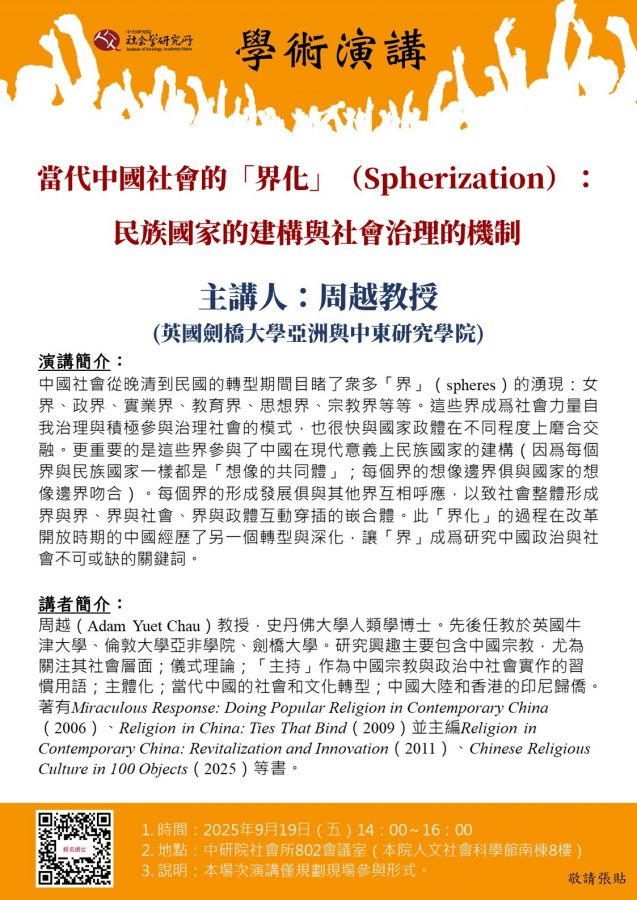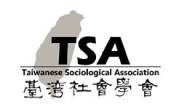中研院社會所9/19「當代中國社會的『界化』:民族國家的建構與社會治理的機制」演講
2025-08-07
【講題】:當代中國社會的「界化」(Spherization):民族國家的建構與社會治理的機制
【講者】:周越(英國劍橋大學亞洲與中東研究學院教授)
【主持】:齊偉先(中央研究院社會學研究所研究員)
【時間】:2025年9月19日(週五),14:00~ 16:00
【地點】:中央研究院社會學研究所802會議室(人文社會科學館南棟8樓)
【報名】:https://forms.gle/YJMAkNyCx99zne7p9
【聯絡】:林先生,ming56@gate.sinica.edu.tw
【演講簡介】
中國社會從晚清到民國的轉型期間目睹了衆多「界」(spheres)的湧現:女界、政界、實業界、教育界、思想界、宗教界等等。這些界成爲社會力量自我治理與積極參與治理社會的模式,也很快與國家政體在不同程度上磨合交融。更重要的是,這些界參與了中國在現代意義上民族國家的建構(因爲每個界與民族國家一樣都是「想像的共同體」;每個界的想像邊界俱與國家的想像邊界吻合)。每個界的形成發展俱與其他界互相呼應,以致社會整體形成界與界、界與社會、界與政體互動穿插的嵌合體。此「界化」的過程在改革開放時期的中國經歷了另一個轉型與深化,讓「界」成爲研究中國政治與社會不可或缺的關鍵詞。
【講者簡介】
周越(Adam Yuet Chau)教授
史丹佛大學人類學博士。先後任教於英國牛津大學、倫敦大學亞非學院、劍橋大學。研究興趣主要包含中國宗教,尤為關注其社會層面;儀式理論;「主持」作為中國宗教與政治中社會實作的習慣用語;主體化;當代中國的社會和文化轉型;中國大陸和香港的印尼歸僑。著有Miraculous Response: Doing Popular Religion in Contemporary China(2006)、Religion in China: Ties That Bind(2009)並主編Religion in Contemporary China: Revitalization and Innovation(2011)、Chinese Religious Culture in 100 Objects(2025)等書。
【活動說明】:僅規劃現場參與形式。
-------------------------------------------------------------------------------
[Topic] Spherization in Contemporary Chinese Society: The Construction of the Nation-State and the Mechanism of Social Governance)
[Speaker] Adam Yuet Chau (Professor, Faculty of Asian and Middle Eastern Studies, Cambridge University)
[Host] Wei-hsian Chi (Research Fellow, Institute of Sociology, Academia Sinica)
[Venue] 8F, Room802, Institute of Sociology, South Wing, Humanities and Social Sciences Building, Academia Sinica
[Brief]
During the transition period from the late Qing Dynasty to the Republic of China, Chinese society witnessed the emergence of many "spheres": women's sphere, political sphere, business sphere, education sphere, ideological sphere, religious sphere, etc. These spheres became a pattern for social forces to govern themselves and actively participate in the governance of society, and they soon merged with the national political system to varying degrees. More importantly, these spheres participated in the construction of China's nation-state in the modern sense. Because each sphere is an "imagined community" like the nation-state, the imaginary boundaries of each sphere coincide with the imaginary boundaries of the country. The formation and development of each sphere echoed with other spheres, so that the society as a whole formed a chimera of spheres, spheres with society, and spheres with political systems. This process of "sphereization" underwent another transformation and deepening in China during the reform and opening up period, making "sphere" an indispensable keyword in the study of Chinese politics and society.
[Speaker]
Professor Adam Yuet Chau is Ph.D. of anthropology at Stanford University. He came to the UK in 2005 and taught at Oxford University (Chinese Studies) and SOAS (anthropology) respectively before coming to Cambridge University in 2008. His research interests includes Chinese religions, especially their social aspects; ritual theory; hosting as an idiom of social practice in Chinese religion and politics; forms of powerful writing; subjectification; social and cultural transformations in contemporary China; the Indonesian Chinese returnees (yin'ni guiqiao 印尼歸僑) in China and Hong Kong. He had published Miraculous Response: Doing Popular Religion in Contemporary China (2006) and Religion in China: Ties That Bind (2009); also edited Religion in Contemporary China: Revitalization and Innovation (2011) and Chinese Religious Culture in 100 Objects (projected).

【講者】:周越(英國劍橋大學亞洲與中東研究學院教授)
【主持】:齊偉先(中央研究院社會學研究所研究員)
【時間】:2025年9月19日(週五),14:00~ 16:00
【地點】:中央研究院社會學研究所802會議室(人文社會科學館南棟8樓)
【報名】:https://forms.gle/YJMAkNyCx99zne7p9
【聯絡】:林先生,ming56@gate.sinica.edu.tw
【演講簡介】
中國社會從晚清到民國的轉型期間目睹了衆多「界」(spheres)的湧現:女界、政界、實業界、教育界、思想界、宗教界等等。這些界成爲社會力量自我治理與積極參與治理社會的模式,也很快與國家政體在不同程度上磨合交融。更重要的是,這些界參與了中國在現代意義上民族國家的建構(因爲每個界與民族國家一樣都是「想像的共同體」;每個界的想像邊界俱與國家的想像邊界吻合)。每個界的形成發展俱與其他界互相呼應,以致社會整體形成界與界、界與社會、界與政體互動穿插的嵌合體。此「界化」的過程在改革開放時期的中國經歷了另一個轉型與深化,讓「界」成爲研究中國政治與社會不可或缺的關鍵詞。
【講者簡介】
周越(Adam Yuet Chau)教授
史丹佛大學人類學博士。先後任教於英國牛津大學、倫敦大學亞非學院、劍橋大學。研究興趣主要包含中國宗教,尤為關注其社會層面;儀式理論;「主持」作為中國宗教與政治中社會實作的習慣用語;主體化;當代中國的社會和文化轉型;中國大陸和香港的印尼歸僑。著有Miraculous Response: Doing Popular Religion in Contemporary China(2006)、Religion in China: Ties That Bind(2009)並主編Religion in Contemporary China: Revitalization and Innovation(2011)、Chinese Religious Culture in 100 Objects(2025)等書。
【活動說明】:僅規劃現場參與形式。
-------------------------------------------------------------------------------
[Topic] Spherization in Contemporary Chinese Society: The Construction of the Nation-State and the Mechanism of Social Governance)
[Speaker] Adam Yuet Chau (Professor, Faculty of Asian and Middle Eastern Studies, Cambridge University)
[Host] Wei-hsian Chi (Research Fellow, Institute of Sociology, Academia Sinica)
[Venue] 8F, Room802, Institute of Sociology, South Wing, Humanities and Social Sciences Building, Academia Sinica
[Brief]
During the transition period from the late Qing Dynasty to the Republic of China, Chinese society witnessed the emergence of many "spheres": women's sphere, political sphere, business sphere, education sphere, ideological sphere, religious sphere, etc. These spheres became a pattern for social forces to govern themselves and actively participate in the governance of society, and they soon merged with the national political system to varying degrees. More importantly, these spheres participated in the construction of China's nation-state in the modern sense. Because each sphere is an "imagined community" like the nation-state, the imaginary boundaries of each sphere coincide with the imaginary boundaries of the country. The formation and development of each sphere echoed with other spheres, so that the society as a whole formed a chimera of spheres, spheres with society, and spheres with political systems. This process of "sphereization" underwent another transformation and deepening in China during the reform and opening up period, making "sphere" an indispensable keyword in the study of Chinese politics and society.
[Speaker]
Professor Adam Yuet Chau is Ph.D. of anthropology at Stanford University. He came to the UK in 2005 and taught at Oxford University (Chinese Studies) and SOAS (anthropology) respectively before coming to Cambridge University in 2008. His research interests includes Chinese religions, especially their social aspects; ritual theory; hosting as an idiom of social practice in Chinese religion and politics; forms of powerful writing; subjectification; social and cultural transformations in contemporary China; the Indonesian Chinese returnees (yin'ni guiqiao 印尼歸僑) in China and Hong Kong. He had published Miraculous Response: Doing Popular Religion in Contemporary China (2006) and Religion in China: Ties That Bind (2009); also edited Religion in Contemporary China: Revitalization and Innovation (2011) and Chinese Religious Culture in 100 Objects (projected).




